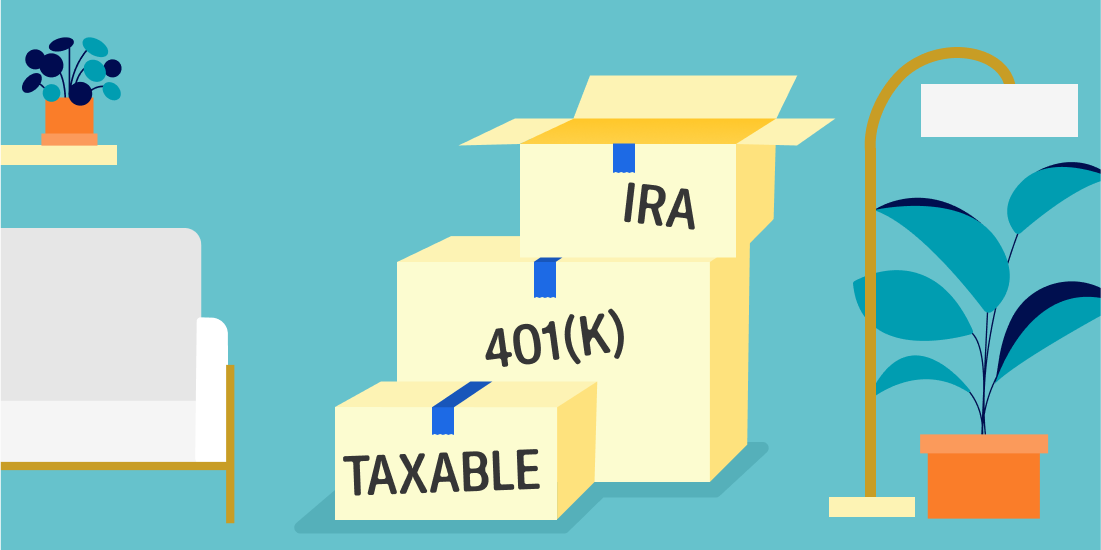Rollovers And Transfers

Featured articles
-
![]()
Should you pack up and roll over your old accounts?
From rollovers to transfers, deciding whether to make a move boils down to a few factors.
Should you pack up and roll over your old accounts? From rollovers to transfers, deciding whether to make a move boils down to a few factors. 401(k)s, IRAs, and taxable accounts have a habit of piling up over the years. People change jobs. They dabble in new investments. They try out different advisors. So every now and then, it’s good practice to weigh the pros and cons of consolidation, including access to tax-smart tools, low fees, and automated investing. We break down a few considerations below to help guide your thinking, compare options, and make the right call for your specific situation. Three considerations for making a move Performance Personalization Goal alignment Special considerations for tax-advantaged accounts Special considerations for taxable accounts A sneak peek of how we make moving easier I. Three considerations for making a move Performance It all comes down to this, doesn’t it? Will Advisor B outperform Advisor A? Will they help my investing generate more gains? We couldn’t agree more, albeit with a big clarification: Returns are a major part of performance, but they're only one piece of the pie. Taxes and fees can take a bigger bite out of your investments than you may realize. So before we help you compare returns, let’s first look at these two other pieces. Taxes To maximize your returns, minimize your taxes. And tax-savvy advisors like us take advantage of three strategies to do just that. If your old investments can’t access these benefits, it may be time for a change of address. The first strategy is called asset location, or slotting investments into different account types depending on those accounts’ tax treatments. It’s specific to retirement accounts, and it becomes much easier to do (and do well) when those accounts are consolidated with one provider. Our Tax Coordination feature takes asset location to the next level. The second strategy is specific to taxable accounts: tax loss harvesting. Tax loss harvesting can take a portion of your taxable investing and turn it into tax-advantaged investing. It’s become a tax strategy for the masses thanks to technology like ours and the low-cost trading of exchange-traded funds (ETFs). Speaking of ETFs, they’re considerably more tax-efficient than most mutual funds. All of our stock and bond portfolios are built with ETFs, whereas some legacy 401(k) providers’ technology can’t even support them. If you find yourself with old investments in the form of mutual funds, consider taking a hard look at their potential tax drags and, just as importantly, their costs. Fees Investing fees fall into two main buckets. There’s the advisor fee, which goes to whoever manages your investments on your behalf (like us!). Then there are fund fees, also known as “expense ratios” or “fund operating expenses.” These are charged by the investment funds themselves that make up your portfolio. So what’s a reasonable amount to pay for each? The average advisor charges roughly 1% of the assets they manage for you. Our annual fee for investing comes in well below that average. A 401(k) with even a modest fee may cost you tens of thousands of dollars over time. The savings from rolling into a Betterment IRA of low-cost ETFs, meanwhile, can add up to a more comfortable retirement. On the fund front, the average cost of an ETF is 0.16%, about one-fourth of the cost of the average mutual fund. The biggest ETF in our Core portfolio, for example, charges 0.02%. We make it easy to see the fund fees for each investment at Betterment. Simply navigate to the Holdings tab of any goal, where you can toggle between the “Fund fees per year” expressed as a percentage of your assets or a dollar amount. Some advisors are less than forthcoming about the fees tied to their services or the investments they choose. So ask questions, and consider it a red flag if they don’t make it easy to understand your all-in costs. Returns Here’s where things get tricky, because comparing apples-to-apples returns between different providers and their various portfolios can be difficult. Some may be selling apples, while others may be selling a low-cost, globally-diversified assortment of fruit. But you can level-set somewhat by comparing portfolios with 1) similar allocations of stocks and bonds and 2) similar levels of diversification. U.S. equities have outperformed international markets since the Great Recession, but those tables were turned for extended stretches in the 80s, 90s, and 2000s, and they very well could turn again. Personalization For many investors, it’s important to know what they’re investing in—and to feel excited about it. So if your old 401(k)’s “2050 Target Date Fund” doesn’t exactly set your heart aflutter, try scoping out alternatives. It’s why we build easy-to-understand portfolios appealing to a wide range of interests from socially responsible investing to innovative technology. Each one can be customized to your specific target date and easily updated when life happens and circumstances change. Goal alignment Consolidating more of your retirement accounts under the same roof unlocks several benefits. Asset location, as previously covered, is one. Asset allocation, or the ratio of different asset types like stocks and bonds, is another. It’s best when accounts serving the same goal add up to your preferred asset allocation, and that can be hard to accomplish when they’re spread across multiple advisors. At Betterment, you can nest multiple accounts under the same goal and easily set one asset allocation for all of them. II. Special considerations for tax-advantaged accounts If you’re considering moving tax-advantaged accounts like 401(k)s, 403(b)s, and IRAs, keep a few more things in mind. Account compatibility – Deciding what kind of account to move to can make for a dizzying decision, but in a nutshell: Roth accounts must be moved to a fellow Roth account. Traditional IRAs typically move into traditional IRAs. Exceptions include some cases of backdoor Roth conversions. 401(k)s can flow into either a 401(k) or IRA. Here’s a simplified version of the IRS’s infamous rollover chart to help: Roll to Roth IRA Trad. IRA Trad. 401(k) Roth 401(k) Roll from Roth IRA ✓ X X X Trad. IRA ✓ ✓ ✓ X Trad. 401(k) ✓ ✓ ✓ ✓ Roth 401(k) ✓ X X ✓ Some important qualifiers depend on your exact move, so we suggest studying the full chart carefully. A big one to call out is that any traditional (i.e. pre-tax) funds moved to a Roth (i.e. after-tax) account must be included in your taxable income for that year and taxed accordingly. It’s one reason why we highly recommend working with a tax advisor, especially if your specific case isn’t so cut and dry. Access – After you leave a job, your 401(k) from that job is still yours, and you can still change its investments, but you can no longer contribute to that specific 401(k) account. Avoiding taxes – In most cases, you can move tax-advantaged accounts to a new provider and pay zero dollars in taxes, but if you simply cash them out and pocket the money before the age of 59 ½, those funds are subject to a 10% early withdrawal tax on top of ordinary income tax, with few exceptions. III. Special considerations for taxable accounts Moving taxable accounts potentially comes with (surprise, surprise) tax implications. The first thing to do is suss out which of your old assets can be moved “in-kind” to a new provider. This means the new provider is able to accept the new assets, either slotting them into your new portfolio as-is or selling them on your behalf and reinvesting the proceeds. Some assets first need to be sold before you can transfer the funds. In these cases, you can first work with a new provider (like us!) and a tax advisor to estimate the potential tax hit. Then, if you decide to move ahead, you’d work with your old provider to liquidate those assets before transferring the funds. IV. A sneak peek of how we make moving easier The process of actually packing up and making a move can be complicated. It doesn’t help that it takes two advisors to tango, and your old provider may not make things easy. But we do everything possible on our end to help streamline the process. That includes letting you quickly initiate a transfer or rollover in the Betterment app. Some transfers can be serviced entirely online, whereas other transfers and most rollovers require some paperwork. If you’re considering moving $20k or more, our Licensed Concierge team is available at no cost to walk you through all the considerations above, size up whether a move is in your best interest, and should you decide to switch, help move your old assets to Betterment. Because whether moving to a new house or a new advisor, it never hurts to have a little help. -
![]()
How we help move your old accounts to Betterment
Moving investment accounts from one provider to another can be tedious and complicated. We ...
How we help move your old accounts to Betterment Moving investment accounts from one provider to another can be tedious and complicated. We help smooth out the process. Moving investment accounts from one provider to another can be complicated. You may be in the early days of mulling over a move. Or maybe you’re ready to make a switch and simply need a little help making it happen. Wherever you are in the process, we’re here to help. And once you’re ready to act, you can easily start the ball rolling in the Betterment app. The steps vary slightly different depending on your situation and how willing your old provider is to play ball: ACATS — Most taxable accounts, and even some retirement accounts, can be transferred automatically by simply connecting your old provider’s account to Betterment. You stay invested, and the entire process often takes less than a week. Direct rollover/transfer — Some retirement account providers, meanwhile, require a check be mailed to either you or your new provider. In these cases, we provide step-by-step instructions for reaching out to your old provider to initiate the process, which often takes 3-4 weeks. And for those considering moves of $20k or more, our Licensed Concierge team can help you size up the decision before helping shepherd your old assets to Betterment, all at no cost. Here’s how. The Betterment Licensed Concierge experience Whether you’re already sold on a switch or need help weighing the pros and cons, our Concierge team uses a three-step process to help guide your thinking. Step 1: Assess where you are, and where you want to be We start every Concierge conversation by gathering as much information as possible. What are your financial goals? How well do your old accounts align with those goals? How much risk are you exposed to? How much are you currently paying in fees? We sift through statements on your behalf to decode your old provider’s fees. We analyze your old portfolios’ asset allocations. And we help assess whether Betterment’s goal-based platform could help meet your needs. All of this information gives us and you the context and confidence needed to take the next step. Step 2: You make a call, then we chart a course forward While retirement accounts can be rolled over without creating a taxable event, that’s not always the case with taxable accounts. So in those scenarios, we provide a personalized tax-impact and break-even analysis. This shows you how much in capital gains taxes, if any, a move may trigger, and how long it might take to recoup those costs. We always recommend you work with a tax advisor, but our estimate can serve as a great first step in sizing up any tax implications. Should you choose to bring your old investments to Betterment, we help you with every step of that journey. The mechanics of moving accounts This includes sussing out which of your old assets can be moved “in-kind” to Betterment. We’re able to easily accept these assets, and either slot them into your shiney new Betterment portfolio as-is, or sell them on your behalf and reinvest the proceeds. If any old assets need to be liquidated before they’re transferred, we’ll help you work with your old provider to make it happen. This includes providing you with a full list of relevant assets to give your old provider. Whether transferring assets or cash, we use the ACATS method whenever possible to help your funds move and settle quicker. Step 3: Moving day! Making a move is exciting. Unpacking? Not so much. So we help set up and optimize your Betterment account to make the most of features like Tax Coordination. Need help setting up your goals? We have you covered there, too. Once everything is in order, we’ll begin implementing your transfer plan. We’ll communicate all the steps involved, the expected timeline, and handle as much of the heavy lifting as possible. We regularly check-in and, once your assets or funds arrive on our end, we’ll send you a confirmation making sure all your transfer-related questions are answered to the best of our abilities. Ready, set, switch Moving accounts to a new provider can be a hassle, so we strive to shoulder as much of the burden as possible. It starts with a simple step-by-step process in the Betterment app, and for those exploring moves of $20k or more, extends to our dedicated team of Concierge members. They’re standing ready to help give your old assets a new life at Betterment. Because whether moving to a new house or a new advisor, it never hurts to have a little help. -
![]()
How to navigate the sunk cost fallacy
And bring your old, underperforming investments to Betterment
How to navigate the sunk cost fallacy And bring your old, underperforming investments to Betterment Let’s say you love Betterment. (The feeling’s mutual, by the way.) You have some old investments lying around, investments you’re leaning toward moving over here, but you can’t bring yourself to do it. Why? They’ve lost value as of late, and they’re now worth less than what you paid for them. In this scenario, you’re dealing with a dangerous animal: The sunk cost fallacy. Also known as the “breakeven” fallacy, it’s a phenomenon we’ve all likely experienced at some point. It's hard to sell anything at a loss, be they stocks, bonds, or Beanie Babies. Advisors often rely on hard facts to combat this thinking. For example: Did you know that an asset experiencing a 50% loss must see a 100% gain just to be made whole? That’s a long way to go. But most fallacies aren’t successfully fought with facts. Because we’re all human, and we often make decisions based on emotions. So here are two simple tips that can help you lean into these feelings, hurdle this mental roadblock, and give your old investments new life. Reframe the narrative Thinking of the move as “selling your losers” or “cutting your losses” is a surefire way to trigger feelings of loss aversion. It’s also a little overstated in this circumstance. Unlike selling your Beanie Baby collection, moving your old investments to your preferred broker isn’t swearing off the concept of investing altogether. You’re selling these stocks and bonds, yes. But that’s in order to buy other stocks and bonds with a different strategy for growth moving forward. Better yet, when you invest with Betterment, those new assets you just bought come with some shiny new bells and whistles. Features like automated rebalancing and tax-smart trading. Benefits designed to help maximize your returns. The longer you wait, the less time you have to use them. So think of the move in positive terms. You're not selling your losers and calling it quits. You're swapping them for a new strategy. Use reverse psychology If your brain’s going to insist on avoiding losses, let’s use that aversion against it. You can do that by shining a spotlight on the less obvious losses that could be slowly eating away at your old investments: fees and taxes. It’s 2025 AD, and it’s still pretty standard for advisors to charge 4 times the amount we do. That’s an extra 750 bucks vanishing for every $100,000 of investments. Then there’s the cost of the investments themselves. The average mutual fund expense ratio can be up to 5 times(!) that of the typical exchange-traded fund (ETF). Worse yet, you may have to pay taxes on a mutual fund even when the fund loses money. A loss by any other name is still a loss. And all of the examples above could be causing your old investments to bleed value. The sooner you make a switch, the sooner you can stop the bleeding.
Considering a major transfer? Get one-on-one help with one of our experts. Explore our licensed concierge
Looking for a specific topic?
- 401(k)s
- 529s
- Asset types
- Automation
- Benchmarks
- Bonds
- Budgeting
- Compound growth
- Costs
- Diversification
- Donating shares
- ETFs
- Education savings
- Emergency funds
- Financial advisors
- Financial goals
- Flexible portfolios
- Getting started investing
- Health Savings Accounts
- Home ownership
- IRAs
- Interest rates
- Investing accounts
- Market volatility
- Mutual funds
- Performance
- Portfolios
- Preparing to retire
- Retirement income
- Retirement planning
- Risk
- Rollovers and transfers
- Roth accounts
- Stocks
- Tax Coordination
- Tax loss harvesting
- Taxable accounts
- Taxes
No results found




